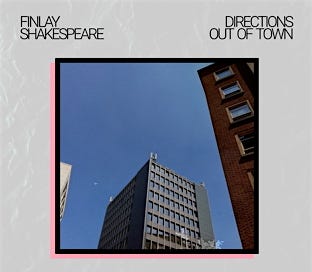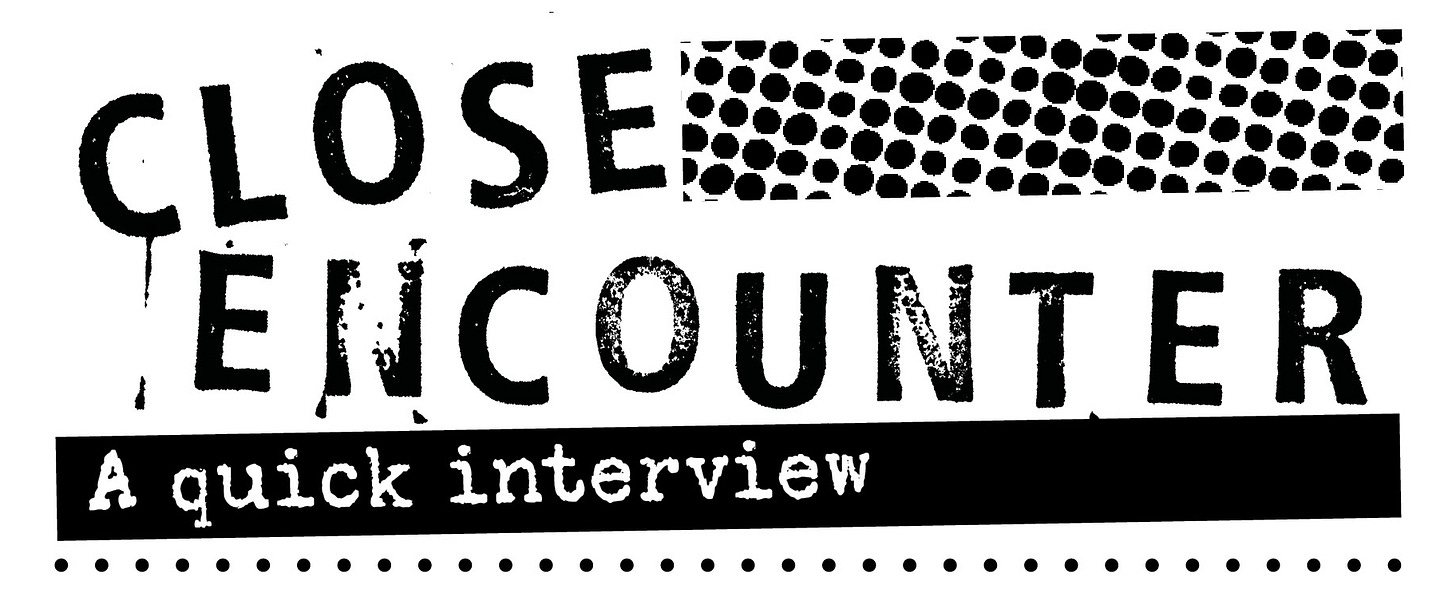Issue 22a / 14 June 2024
In part one of this week's DIY electronic music bulletin... Album Of The Week: Finlay Shakespeare ‘Directions Out Of Town’ + brilliant interview
I’ve been waiting a while for someone to say what Finlay Shakespeare said in our interview this week. He makes so many great points, but it really hit home when he said his new record could well be his last and how none of his albums have covered even their production costs.
He is brilliant at what he does, his energetic full-force synthpop is a real treat, so it’s not that he’s in some day dream about his talent. Far from it. And I suspect he’s not alone. With so much great work being made by such talented artists, how is that a good proportion aren’t even covering costs? As I say in my review, I don’t have the answer. My chat with Finlay is food for thought.
I’ll see you back here at 3.30pm for part two of today’s mailout where I’ll tell you about yet another load of hugely talented folk making really great music.
Neil Mason, editor
moonbuildingmag@gmail.com
Issue 22 Playlist: See this afternoon’s mailout
The Moonbuilding tip jar: ko-fi.com/moonbuilding
***ADVERTISE HERE***
Email moonbuildingmag@gmail.com
FINLAY SHAKESPEARE ‘Directions Out Of Town’ (Editions Mego)
Finlay Shakespeare is a great name, not one you forget in hurry. It’s a name you will most likely have heard before, but that’s probably as far as it goes – you know the memorable name, but not the memorable music he makes. Which is something of a problem.
I’ll just pop him into your mind. He’s recently come off tour as a member of the Blancmange live band, he’s also in the support act, The Remainder, along with Neil Arthur and keyboarding percussionist Liam Hutton, same band, different sets. Those live shows were proper value for money.
Finlay also makes synth modules, turning the dreams of people like Chris Carter and Daniel Miller into reality, and he’s the in-house engineer at Moog Sound Lab UK at the University of Surrey in Guildford. Basically, that’s a room full of kit on long-term loan from Moog HQ thanks to Blast First’s Paul Smith. Long story, ask me another time.
On top of all that he runs his own label, GOTO, which is pretty great. There’s a dozen or so releases, do check out the work of Newhaven’s Battery Operated Orchestra, Bristol’s Licking Orchids and Austria’s General Magic.
Lastly, but by no means leastly, Finlay Shakespeare is a rather excellent recording artist in his own right. ‘Directions Out Of Town’ is, by my counting, his sixth long player. His last one, 2023’s ‘Illusion + Memory’, was especially good. This one is better.
What sort of music do you imagine someone with a name like Finlay Shakespeare makes? Nope. Have another guess. Not that either. He makes quirky synthpop. The sounds are pure, the songwriting powerful. He also has a pair of lungs on him – opener ‘Away’ is quite Mark Hollis-y, which I appreciate is Billy Big Boots talk, but Finlay Shakespeare makes Billy Big Boots music.
‘Get’ is a belter, those warm thrumming synths, rattling drum machine and rapid-fire vocal is like something you might have picked up on an early Mute seven-inch. He also does downtempo, ‘Direction’ shudders away under the soaring vocal, synth lines building and entwining as the song reaches the end.
Then comes a proper triple whammy, three tracks that form the centrepiece of the record. Once they’ve started you won’t dare move until all three are finished with you. ‘I Go For a Walk’ builds and builds with Finlay getting increasingly shouty as it reaches it dramatic climax, like ‘Violator’ bouncing down a bumpy hill in a soapbox go-cart. ‘Face Value (Trio Mandala)’ is brilliant. The rat-a-tat squiggly synths and deep buzzing bass are belting with Finlay picking his way through it all with a rich vocal melody over the top. Love how it wigs out towards the end, with sounds dropping out until it merges into ‘International’, an uptempo stomper with more great vocal acrobatics and a rattlingly good tune that’s channelling ‘Sound Of The Crowd’.
I rarely work my way thorough an album track by track, but here it’s hard not to. Two to go. ‘Go Back’ slows things down, and boy, the sounds he eeks from his gear. Here, a deep growl of bass notes shudders speakers. What stands out is the sequencing, it’s a proper album with a beginning, middle and end. Something made for listening to from start to finish. The closer ‘Poli’ is epic. Seven and half minutes of epic at that. It starts off like a slow-mo car alarm, over and over, at three and half minutes another layer is added, a bright arpeggio pings away, you can feel the whole thing swell, like the volume being dialed up slowly as it locks itself down and growls towards the album’s conclusion. You do that thing when it finishes – the sign of all good records – you sit in the silence for a while once those last notes have slipped away. You take a moment, let it soak in.
Which is all well and good. It’s a great listen. Had it on repeat here at Moonbuilding HQ for a while, but here’s that problem we mentioned earlier. Finlay candidly admits none of his releases have made back their production costs. None. And he’s good, really good. He talks about respecting the labels that release his work. “I want to support them,” he says, “but to be costing them money at the end of the day is not good.”
There are people making money round here – pressing plants, printers, packaging, postal services, all the Ps, ain’t none of their services coming for free. So why is it the creativity that drives this whole thing, the artists and labels, have to be fueled by thin air? I don’t have the answers, I know only too well from my own experience with Moonbuilding that it’s a zero sum game. In our chat below, Finlay reveals he’s recently taken a supermarket job to sustain himself, his live agent has done likewise. So that’s the guy who books the gigs and the one who plays them. Without people like Finlay Shakespeare making records like ‘Directions Out Of Town’, we don’t have much. Dancing in an empty room to silence ain’t an option. Treating yourself to this excellent release would be a good start. It’d be good to see it pay its way. I mean, no one is in this to get rich. Making a modest living would do. But if you’re a creative these days, that seems to be an idea that’s away with the fairies. And that can’t be right. Can it? So what are we going to do? Bright ideas to the usual address.
FINLAY SHAKESPEARE
In an incredibly honest chat, we tackle the problem with the album format, the idea of belonging, why shouting is good for you and how despite having what seems like 99 problems, he’s not even remotely ready to give up
Photo: Finlay Shakespeare
Interview: Neil Mason
Hello Finlay, how’s things? What are you up to today?
”Not bad I must say. Today I’ll be getting some file management done before heading off to work.”
Electronic musician, producer, audio engineer and synth builder… you’ve had some adventures and worked with proper legends over the years haven’t you?
”A lot of it has been complete chance, I had an incredibly lucky run really. It would tend to go that one thing followed another, a little bit of a domino effect I guess.”
Luck! Let’s run through a few landmarks… you’re a member of the Blancmange live band. That must be a hoot?
“Yes absolutely, it’s been fab to contribute to the Blancmange sets after watching so many gigs while on support for them. Neil Arthur is very happy for me and Liam [Hutton] to push the parts in our own directions – he knows what he wants though!”
You’re also part of the Moog Sound Lab UK, based at the University of Surrey in Guildford. Tell me a bit about mucking about with a room full of Moogs…
”So my role is in-house engineer. I was brought on board via Tony Myatt who was at the university while I was finishing my studies. He’s good friends with Paul Smith of Blast First, Disobey, etc, who’s the brains behind the whole project. It is, as most would imagine, an absolute dream to work with. I remember the first days of putting all the equipment together very well and just thinking, ‘We have so much stuff’. Projects come and go with it – Paul’s very keen to see things happen, but it’s all a case of time and money really.”
You also have a synth company, Future Sound Systems, and worked with Chris Carter developing the Gristleizer as a module. Wow eh? Another top chap!
“Yes, absolutely! It’s been a pleasure working both with Chris and Roy Gwinn over the years. We do have more to come, but getting projects finished and out the door is tending to take longer and longer these days.”
Anyone else you’ve worked with that you’d like to mention? Do you ever have pinch me moments?
”Well, working with Chris lead us on to working with Daniel Miller. He asked if we could turn a couple of module sketches of his into reality, which we managed to do. Both collaborations have lead us to supplying equipment to some absolute heroes. I won’t name names, but it’s quite an experience knowing that you’re sending something you’ve crafted to someone who shaped the path of us getting there in the first place.”
And missing from that list above is label boss! You’ve put out some excellent releases on your GOTO label. What plans are afoot for that?
”GOTO’s been a bit quiet recently, but I have a collection of cassette releases planned for imminent announcement from quite a broad range of artists – watch this space!”
Right, let’s talk about the new album… I get the feeling ‘Directions Out Of Town’ is a difficult record for you?
“Well, it certainly felt like the strangest to make. This was the first proper body of work to be written after the passing of Editions Mego’s Peter Rehberg – he was always a guiding light for anyone involved with the label. Quite often I would send Peter something in progress and simply ask, ‘Is this shit?’. I’d often receive a reply at some ungodly hour saying, ‘No, it’s rocking, keep going’, or something along those lines. He was rarely negative, but when he was, it was always with masses of constructive criticism, which is something that’s incredibly hard to find nowadays.
“The whole thing came together when I was given notice on my old studio space after being there for over nine years. My friend Robert Davison and I had set the space up when I first came to Bristol, and after Rob moved out of the UK it had remained a space for Future Sound Systems to grow, and eventually move out of, but also as a place I could keep all the equipment ready and primed for recording. I had a couple of months or so to finish this collection of tracks to make an album work – that was the final push to get it done.”
The process of actually making the record was different too, wasn’t it?
“Working on these tracks, it often felt like my hands were being guided, a lot of the process was automatic. I tried my utmost to not doubt any of it. The only thing I was trying to avoid was any kind of sonic metaphor. I wanted to pursue synthetic sounds that didn’t necessarily sound like anything else – avoid brass and strings in favour for just ‘this is a synthesiser’. This applied to every stage of the production too, trying to limit myself to certain workflows concerning the mix, take editing, all sorts.”
You say that “I essentially don’t know where I belong any more”. Care to elaborate?
“I think this is due to a bunch of different, quite disparate things. Losing Peter is clearly one of them, but I think musically I’m unsure where I really fit, including the social element. I find a lot of the current ‘synthpop’ stuff far too clean and polished to really align myself with, but I’m also not a goth, neither am I making more academically aligned electronic music… although I love a lot of that and its crowd dearly. It’s nice to be situated somewhere in the middle perhaps, but it also feels like a bit of a lonely space.”
You’re also saying this could be (possibly) your last LP? Nooooooooo!
”Potentially, yes, but with real emphasis on the LP bit. None of the solo physical releases I’ve had the privilege of putting out have made back their production costs. This is a problem when you respect the label putting out the work. I want to support them, even as a punter, but to be costing them money at the end of the day is not good. Perhaps at some stage there’ll be a second wind, but it’s doubtful with the sheer amount of music that is released each week. I’m about to receive the majority of UK stock of my back catalogue, so at least it isn’t being pulped or crushed, but I’m also unsure what I’m going to do with 200 copies of a record that nobody really wants to buy!"
What’s the solution for you?
”There are definite limits to two sides of vinyl and, although I love the album format, it’s time to look outside of that a bit. The whole process comes with a time lag – this new album is essentially a year old before it’s even released – and an anti-climax. It’s months worth of work that may only be listened to by a handful of people for the first week of release. Compare this to digital releases that can be added to over time, organised not as albums but as growing bodies of work. That interests me more these days.”
We’re a bit worried about you. Fail We May, Sail We Must and all that, we thought you were quitting!
”Well, I’m not necessarily quitting, just on to slightly different pastures. I’m keen to keep collaborations going, the solo thing gets a bit lonely after a while, and it’s been a real pleasure to work with other people, especially post-Covid where we can all be in the same room.”
You say that lyrically the album is dealing with “loss – personally, geographically, politically, culturally, a general decay of everything”. That’s a lot of loss. ‘Directions Out Of Town’ would seem to be a pointed title?
”The year between the album being finished and being released has been quite difficult – moving the studio into storage, then having to move out of storage due to its rising cost; a car crash which left me out of work for a fair while; a tax bill that has crippled my business and sense of self-worth; the break-up of a long-term relationship and having to move on, in all manners, from that; having to take up a job at a local supermarket to keep the bills paid; losing my agent because they had to do similar; the potential closure of Future Sound Systems towards the end of the year. This coupled with the ongoing world events that everyone has been exposed to in all forms of media. Going back and listening to this album to check the masters and test pressings, a huge thanks to Cicely Balston, everything contained in the album seemed to be prescient on both personal and more international levels.”
It’s a great record, I really love ‘I Go For A Walk’, it’s a belter, so shouty. Like Depeche meets oh, I dunno, Sleaford Mods. Having a really good shout always seems to help, right?
”Thank you! ‘I Go For A Walk’ was really an exercise in how far could I push everything, including the shouty thing. The drums came from a complete mess of sequencing that I sent to a really crap Yamaha tone generator then processed no end. The guitar parts I recorded incredibly loudly just because it was likely the last time I’d ever be able to do that. The vocals end up being stacked up many times over, but with me doing various things to try to push the performance. I remember pulling at my cheeks while trying to scream – that track in particular is just this horrible croaky vocal that works really well in context. There were other takes with my head pushed down by one hand while trying to sing. Another with the same hand pushing against my throat.”
What’s your favourite shouty song by someone else?
”Likely something by Gang of Four or Wire, ‘Mercy’ off ‘Chairs Missing’ springs to mind.”
There’s a trio of songs in the middle of the record, ‘I Go For A Walk’, ‘Face Value (Trio Mandala), ‘International’, which make it feel like albums used to in the old days. A proper record, with all the tracks in the right order!
”Thanks again! There is something in the way this album is sequenced that becomes apparent with the record itself – I won’t reveal any spoilers.”
When I listen to your work I hear Ultravox, John Foxx, wonky Depeche Mode… what else is in there?
”So, with the whole metaphor-avoidance thing, I was actively trying to stay away from taking any real direct inspiration from music so much. However, I got really into the ideas of structural film and its notion that what-you-see-is-what-you-get. For the uninitiated, a lot of the classic structural film work features the idiosyncrasies of the medium itself, such as sprocket holes, various printing methods made obvious, even scratches applied to the film. For a lot of the work on the album, I was trying to retain this idea of what-you-hear-is-what-you-get.
“For example, applying reverb to a sound is typically done to try to place a sound in a certain space, at least psychoacoustically speaking. I didn’t want to do that here, and if it was going to be done I wanted the reverb to be as much of a feature as the sound itself. So, the reverb doesn’t remain a constant as it does in most mix work – the shape and size of the virtual room changes. The listener isn’t being tricked into thinking the sound is in a room any more, they’re actually knowingly listening to this reverb, etc. etc.
“Any mimicry with synthesisers was avoided, as I mentioned above, so there’s a fair bit of live percussion and guitar across the record. When the percussion is synthetic, it’s hopefully alien enough to not really resemble any typical acoustic instruments.”
Love the epic squall of the closer ‘Poli’. That’s one big tune to end with. It’ll be a good un live?
”Thank you! We’ll see...”
Talking of which… you’re a whirlwind live, you blow everyone away when you play. Where does that come from? It looks exhausting!
”He-he-he, thanks again. I guess it’s a bit of a subconscious effort to make the performance interesting to the audience. Electronic music can be an incredibly stale thing to witness in a live environment, and my performances could’ve really easily slip into staring at a couple of boxes, tweaking various parameters. I’ve really enjoyed it over the years.”
I notice you’re making your festival debut this summer. Looking forward to that?
”Massively so, yes. I have Nik Void to thank for inviting me over to Kendall Calling to play. It’ll likely be the last show for a long time too. Going to make it a real banger of a set, fingers crossed.”
What’s next for you?
”Stacking shelves at the Co-Op.”
For more Finlay Shakespeare, see finlayshakespeare.bandcamp.com
***ADVERTISE WITH US***
Email moonbuildingmag@gmail.com
A MESSAGE FROM THE MOTHERSHIP
MOONBUILDING ISSUE 4, £5 (+P&P). GRAB YOURS WHILE STOCKS LAST … MOONBUILDING.BANDCAMP.COM
The latest issue of MOONBUILDING is full to the gills with the good stuff. On the cover, star-in-the-making Maria Uzor, we profile label-of-the-moment quiet details, there’s an incredible interview with Captain Star creator Steven Appleby, and Ghost Box’s Jim Jupp gets busy with our There’s A First Time For Everything questions.
We review a big pile of releases from labels including Castles In Space, Woodford Halse, Persistence Of Sound, Assai, Ahora, DiN, Werra Foxma, Ghost Box and many more. There’s a column from The Orb’s Alex Paterson and the world-famous Captain Star cartoon strip.
This issue’s CD is ‘The Moonbuilding Miscellany – Volume One’, which is put together by CiS supremo Colin Morrison. It’s a belter featuring tracks from the likes of Lo Five, Lone Bison, Twilight Sequence, Ojn, NCHX and more.
Moonbuilding Weekly is a Castles In Space publication.
Copyright © 2024 Moonbuilding









